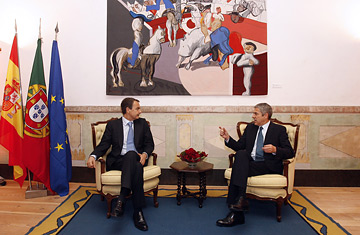
Spanish Prime Minister Jose Luis Zapatero, left, and his Portuguese counterpart Jose Socrates enjoy a break during the two-day Portugal/Spain summit.
When Spain's Socialists ousted the conservative Popular Party four years ago, José Luis Rodríguez Zapatero took the surprise election victory as a mandate for fundamental change. He immediately pulled the country's troops out of Iraq, soon legalized gay marriage, and began to take on centuries of entrenched machismo. If his party's gathering this past weekend is any indication, Zapatero's 2008 political platform will be no less dramatic.
On Friday and Saturday a panel of international experts enthusiastically counseled the Spanish Socialists on key electoral issues ranging from economic growth to social integration, from energy renewal to democratic reform. Yet the most important advice Zapatero received from the "Council of Sages" — as the media dubbed the Prime Minister's Advisory Committee of Progressive Intellectuals — may have been less about the substance of his platform than the manner in which he and his party deliver it.
Zapatero's successes during his term as Prime Minister have come largely in the dramatic social reforms that have not only modernized Spain but transformed it into an international leader. His government's first piece of legislation was a sweeping law to protect women against domestic violence, and in the succeeding months Zapatero's administration eased divorce laws, required gender parity in political parties, reduced the Catholic Church's influence in education, officially recognized victims of Franco's repression, and made Spain the third country in the world after Holland and Belgium to legalize gay marriage.
Not all of the Prime Minister's efforts have been successful. The violent collapse of peace negotiations with the Basque separatist group ETA is his most notable failure — and one that continues to haunt him. Nonetheless, Spain is a very different place now than it was four years ago.
The Committee, designed to bring fresh ideas and test old ones, is part of Zapatero's bid to sustain the momentum of his government's efforts at reform. Made up of 14 world-renowned experts — including Nobel Prize-winning American economist Joseph Stiglitz; Australian anti-nuclear expert and Nobel Laureate Helen Caldicott; ex-Senior Vice-President of the World Bank, Nicolas Stern; and Maria Joao Rodrigues, an architect of the E.U.'s Lisbon Agenda — the council offered a slate of ideas that, if put into action, would position Spain on the cutting edge of international, environmental, economic and social justice policy.
It appears that the Socialists were paying attention. Environment Minister Cristina Narbona, seated in the audience Saturday, was impressed with Stiglitz's discussion of education as a key stimulus for economic growth. "To hear him say that gives us incentive to improve our proposals even more." And in a speech closing Saturday's meeting, Labor Minister Jesús Caldera responded to Caldicott's impassioned critique of nuclear energy by promising to take Spain's remaining eight reactors out of service "when they reach the end of their useful lives."
Committee member Jeremy Rifkin, head of the Foundation on Economic Trends and author of the widely discussed The European Dream, said he believed Zapatero would make "the third industrial revolution" — Rifkin's own proposal to address the world's energy crises by developing renewable energies, storing them with hydrogen, and distributing them via grid technology, as the Internet distributes information — a prominent part of his next government's agenda. "Zapatero gets it," says Rifkin. "He believes in working from the ground up and distributing power equally, and he wants to move away from his country's traditions of top-down, patriarchal authority. He took on machismo — he's a leader for a new generation."
To fulfill any of these lofty hopes, however, Zapatero must first be reelected. Recent polls show the Socialists running nearly even with the opposition Popular Party (PP) as they head towards the National Election, which the prime minister has set for March 9. Like most countries, Spain is suffering the effects of the global financial crisis, and the PP has aggressively criticized the government for excessive spending.
Given the competitiveness of the race, Lakoff's advice may be most valuable to the Prime Minister. Pointing to the PP's depiction of Zapatero as dishonest and dangerous to Spain's political integrity, Lakoff notes, "The Socialists aren't as experienced in political communication as the conservatives, who are using the same themes and techniques as the Republicans in the U.S. Whatever the PP is doing, it's imported — and the right wing here knows how to use it."
Like the other "sages," Lakoff praised Zapatero's accomplishments. But he bluntly criticized the Socialists' failure to position the political debate in a way that helps people grasp why those accomplishments are important. "I covered with President Zapatero all the obvious ways that the PP will attack him," says Lakoff, "from his dealings with ETA, to the economy, to regional autonomy and civil rights. But then I said, 'Look, this campaign is about one thing: do Spaniards want to continue to build a progressive, modern democracy, or do they want to return to the kind of authoritarian regime that the PP wants?' The truth isn't enough — you have to frame it so people will understand it." A leader betting his reelection on the conviction that his compatriots are as progressive as he is should probably listen.
